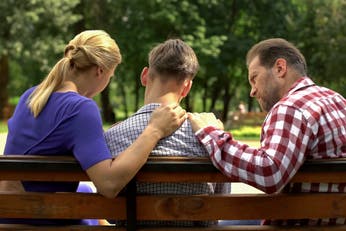“I am a descendant of slaves, the seventh generation of Afro-Argentines. Unfortunately my family tree is very incomplete because around the Afro-Argentine identity there is always a lot of silence, I suppose to hide the suffering. I know that the slave ship that brought us was called La Madrid and that that’s where our last name comes from. But I don’t know where in Africa that ship came from, “says Mailen Lamadrid, with a certainty that he did not always have to be Afro-descendant in Argentina
it’s not a simple thing
.
From an early age, Mailen began to feel ridiculed and discriminated against for her afro features and for being the daughter of a black father. She still remembers when, in kindergarten, she was not allowed to be an old lady for the May 25 event. ”
Your role is bold
, the teacher told me. That marked me a lot, “she recalls in dialogue with La Nación. That episode would be followed by other ridicule and marginalization that, in different ways, were violating her right to fully live her identity, especially during her childhood and adolescence.
For this reason, he is especially concerned about young people who, at times, may become ashamed of their roots. “I have nieces who
they don’t finish accepting
and they iron their hair because they say: ‘my hair is ugly’, ‘I don’t like my hair’ and it is not really something they thought but rather that society has been telling them in different ways. I also went through the stage of using impellers, of mistreating my hair to hide my curlers, “he maintains.
But even within her family, skin color hampered close ties. Mailen knows that her maternal grandfather strongly opposed her white daughter’s relationship – her mother – with a black boy. “I always told my mom that when I went to visit him, it was not with ‘the black’. And we,
his grandchildren, we were ‘the little blacks’ for him
. I was never able to have a grandfather-granddaughter relationship with him, “she acknowledges.
Today he studies law and is active in an organization, Xangó, against racism and in pursuit of inclusion and social justice. She knows that the long history of invisibility and marginalization that the Afro-Argentine community historically lived goes back to today. It translates into poorly paid jobs, less Afro presence in the student faculties as the educational level progresses, and also institutional violence due to carrying face. Although all these violations are difficult to quantify due to a lack of state figures.
“Only in the last census, that of 2010, was the ethnic-racial variable included for the first time.
we know that there are many more people of African descent than the census revealed
(N. de la R .: about 150,000 people, although some estimates multiply that number by ten), which requires a strong work from the state to generate greater awareness of Afro roots. You don’t have to be black to be of African descent. Of course, it is difficult to assume the origins when you see discrimination, social rejection and everything that Afro-descendants suffer, “he adds.
In her adult life, Mailen had to endure being treated as a foreigner on numerous occasions, as if that myth circulating that “in Argentina there are no blacks” were true. Even once
they treated her as a prostitute
, while waiting for the bus in Plaza Miserere.
-How much will you charge?
-I’m not a prostitute. I am waiting for the bus.
-Oh. Sorry. I saw you black and I thought you were a prostitute.
“The idea that black women are very fiery, that we are prostitutes, that we are voluptuous, that we dance well is very common in the collective imagination. Also in men is the idea that they are great dancers, that they have a large penis and that kind of thing. So, for not being very curvy or not knowing how to dance, sometimes I have been told that I am a black trout, “she admits with a hint of grace in her voice, as if acknowledging that the problem belongs to others.
However, he is aware that all that bullying that Afro-descendants begin to suffer at school does not fall on deaf ears. That is why it is committed to prevention from the first years. “With the group we go to schools, we give talks, we talk about micro-racisms and how to detect them. We have a guide for teachers. There we also tell that
we have afro heroes
, like María Remedios del Valle or our first president, Bernardino Rivadavia, who was Afro. They called him ‘Doctor Chocolate’. Our role in the May Revolution was much more significant than that of being candle and empanada vendors, “reflects Mailen, who imagines herself working, when received, for a society with space for everyone.
ALSO
.
Publicado en el diario La Nación

